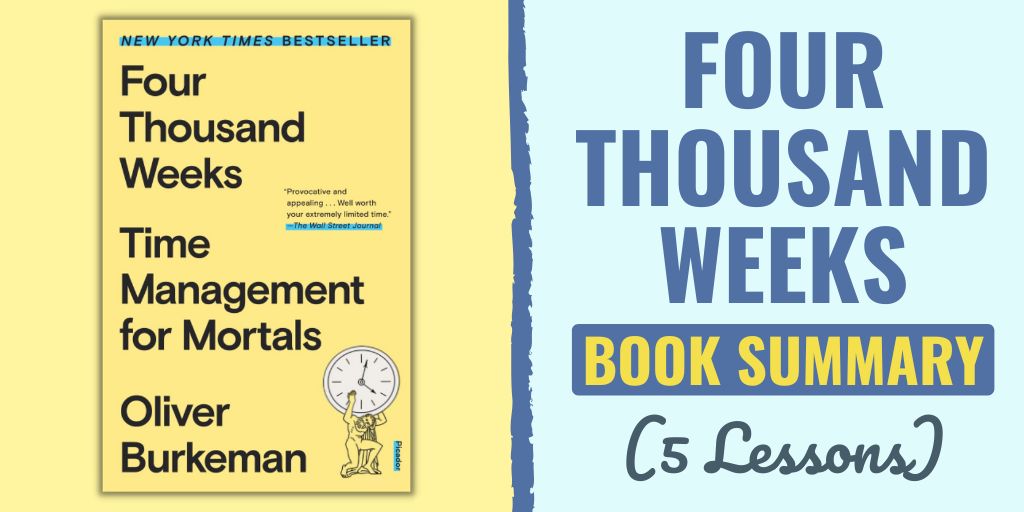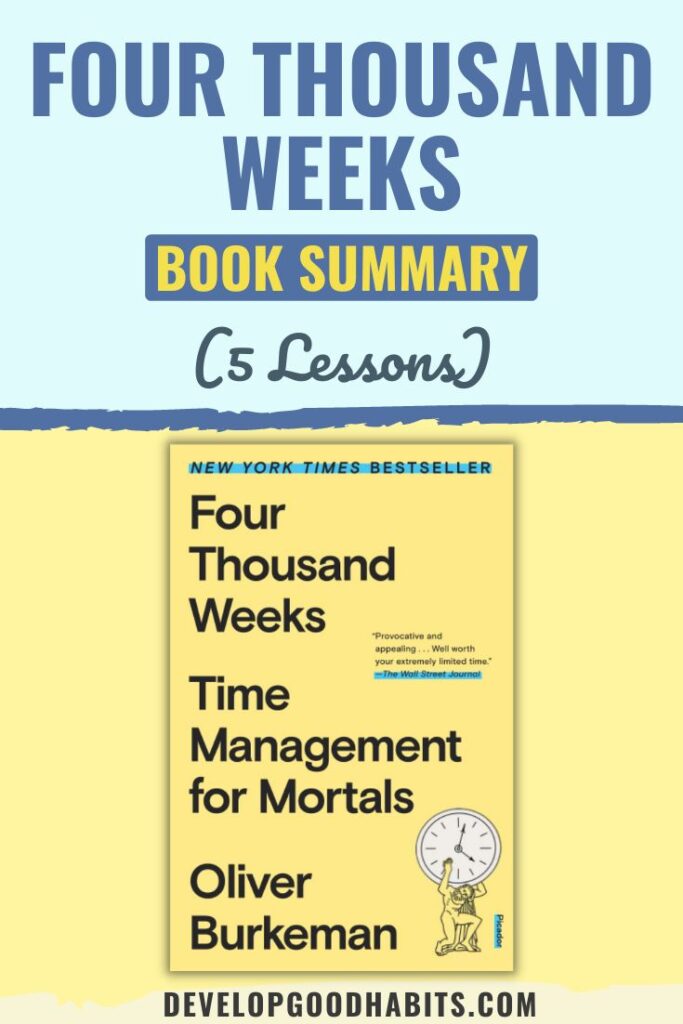In today's fast-paced world, managing your time effectively has become more important than ever. With endless to-do lists and constant distractions, it can be challenging to truly make the most of your day.
But what if you had some practical techniques that can help you better manage your time and lead a more fulfilling life?
In Four Thousand Weeks by Oliver Burkeman, you'll learn about a fresh perspective on time management that aims to alleviate the daily stress and fatigue that often comes with trying to accomplish everything on your to-do list.
The main message the book teaches is to spend your time more wisely, without feeling rushed or constrained by the world around you.
In this post, we’ll highlight 5 lessons you can learn from Four Thousand Weeks.
Now, if you’d like to check out the book, you can read it on your Kindle, get a print copy, or listen to the audiobook.
Now, let’s delve into the book, starting with…
Lesson #1: Understanding The Time Management Crisis
Oliver Burkeman explores the limitations of traditional time management techniques, and how you should adjust your mindset to make the most of your limited time.
The bedrock of this understanding is that the average person has 4,000 weeks in an average lifespan, which means using your limited time wisely is very important.
Burkman’s main point of contention with traditional time management techniques is that they focus on controlling and mastering time, rather than facing its finite nature.
These more traditional techniques are all about “extracting” as much from the day as possible – but all this leads to is stress and frustration, because there’s undoubtedly never enough time to finish everything you need to do in a day.
Instead of overloading your schedule with tasks, the author suggests embracing imperfection and learning to work with the time constraints you face.
Recognizing the limitations of your time can lead to a healthier mindset and a more balanced approach to work and life. So take a step back, re-evaluate your priorities, and remember that it's okay to acknowledge the constraints of time.
Now, let’s build on this understanding with…
Lesson #2: Rethinking Productivity
Have you ever heard of the Zeigarnik Effect? This is a psychological phenomenon where you tend to remember unfinished tasks better than completed ones. Take a look at this video to learn more:
Oliver Burkeman states you can take advantage of this by breaking your tasks into small, manageable chunks. This way, you can focus on one task at a time, fostering a sense of progress.
It's a friendlier and more sustainable approach to productivity that might just help you manage your time better.
Another way Oliver Burkeman redefines productivity is by asking the reader to adopt a Realistic Pessimist outlook. While this may sound bleak, all this means is that you understand that tasks may take longer than you think, you might make mistakes, or you might fail.
This attitude is very similar to stoicism and its principles, instead of tuning out the possibility of failure with relentless positivity, you instead acknowledge and even welcome the possibility of failure.
Paradoxically, this makes difficult tasks even more approachable and better prepares you for setbacks.
Finally, Oliver Burkeman teaches the reader about The Negotiator strategy.
This strategy essentially means that you need to wisely choose which tasks and activities deserve your attention.
The Negotiator mindset helps you prioritize your time by negotiating with yourself what is essential and what can be left undone. By adopting this approach, you'll become more at ease with the idea that you can't do everything – and that's okay.
Remember to keep a friendly tone with yourself throughout this process. Familiarize yourself with the Zeigarnik Effect, embrace being a Realistic Pessimist, and practice The Negotiator mindset.
Lesson #3: Embracing Your Mortality
In “Four Thousand Weeks” the main message of the book is to acknowledge and accept on a deep level that you have limited time on this planet.
Accepting the limits of time can help you use it more wisely and effectively. Instead of trying to squeeze more activities into your schedule or feeling overwhelmed by endless to-do lists, you'll learn to focus on making the best use of your time.
One way to accomplish this is to understand your Top Priority Tasks.
As the saying goes, a hunter that chases two rabbits catches neither.
Burkeman encourages you to be more selective with your time and energy, investing in the most important tasks and activities in your life.
This also aligns with the 80/20 rule, which is an observed phenomenon that shows us that most of the results actually only come from 20 percent of something – whether that’s sales or crop growth.
To learn more about the 80/20 rule and how you can apply it to your life, check out this video:
Finally, Burkeman advises the reader to let go of perfectionism.
In a world where people are constantly seeking self-improvement and optimization, Burkeman advises you to let go of this unattainable ideal.
Instead, he encourages you to embrace the beauty of imperfection and be more accepting of yourself and your life.
This brings us to…
Lesson #4: The Art of Decision Making
Burkeman introduces us to a concept known as the Ulysses Pact.
This refers to Ulysses asking his sailors to tie him to the mast of a ship so as to prevent him from being lured to his doom by the Siren's song – he then tells his sailors to plug their ears so as to avoid the same fate.
Essentially a Ulysses pact binds you to a future goal by committing to actions that you know will get you there – like losing weight by exercising regularly.
The second concept Burkeman discusses is the idea of sacrifice.
Know, this doesn’t mean performing strange rituals but instead simply settling for an option that is good enough instead of paralyzing yourself by seeking the “best” course of action.
By focusing on options that meet your criteria, you free up energy and time for other important tasks.
Finally, Burkeman advises the reader to follow the 5-minute rule.
If a task can be completed in five minutes or less, do it immediately. This strategy helps prevent small tasks from piling up and overwhelming you later on.
Additionally, by accomplishing these minor tasks quickly, you'll build momentum and find it easier to tackle larger projects.
This brings us to…
Lesson #5: The Power of Habits
Burkeman believes that habits are key to making the most of our limited time.
The first concept he introduces is the idea that taking tiny actions over time is the key to developing good habits that help you instead of hinder you.
Small changes in your daily routine can be easier to adopt and maintain without feeling overwhelmed.
For example, you could start by dedicating just 5 minutes to reading about a topic that you want to learn more about or reading books that can help advance your professional skills.
As you become comfortable with these small actions, you can gradually increase their duration or expand on them to create more significant habits.
The second concept Burkeman discusses is understanding habitual cues.
Every habit starts with a cue, which is a trigger that initiates the habit.
Your cues can be anything from a specific time of day to a particular location, or even a certain emotion.
To create new habits or change the existing ones, you should be aware of the cues that initiate them.
For instance, if you want to establish a habit of reading before bed, you could set an alarm or place a book on your bedside table as a cue to remind you to read each night.
The third concept Burkeman introduces is to understand the power of routines.
The routine is the actual behavior or action that follows the cue. Your routines can be simple or complex, depending on the habit you're trying to create.
To establish an effective routine, you need to make it as easy as possible for yourself to follow it consistently.
This might involve breaking down the routine into smaller steps, eliminating distractions, or setting up your environment to support your desired habit.
For a reading habit, this might include limiting yourself to reading a chapter every night, reading at a quiet time when your partner or spouse isn’t around, and having the right reading light.
Finally, Burkeman discusses the concept of rewards.
The reward is the positive outcome or satisfaction you experience as a result of completing the routine.
Reward is important because it’s what makes your habits stick and it’s what will give you the motivation to keep developing a habit every day.
To make your habits stick, it's essential to ensure the reward is meaningful and enjoyable for you.
This could be something as simple as feeling a sense of accomplishment, enjoying the activity itself, or noticing improvements in your overall well-being.
To understand more about how important rewards are for success and habit formation, check out this video on celebrating small wins:
Final Thoughts on Four Thousand Weeks
In “Four Thousand Weeks”, you'll discover a different perspective on time management and productivity. Burkeman makes you realize the importance of embracing the finiteness of your time and finding ways to make the most of it.
As you read the book, remember to keep an open mind and be willing to try new methods to see what works best for your unique circumstances. While some ideas may seem unconventional, they might be the key to helping you reframe your relationship with time.
Now, as a reminder, if you’d like to check out the book, you can read it on your Kindle, get a print copy, or listen to the audiobook.
And if you want to check out another book summary, then watch our video about the 5 lessons you can learn from Atomic Habits by James Clear.
And if you're looking for more book reviews, be sure to check out these blog posts:
- Ego Is The Enemy Book Summary (5 Lessons)
- You Are a Badass Book Summary (5 Lessons)
- Essentialism Book Review (2023 Update)
Finally, if you want to level up your productivity and time management skills, then watch this free video about the 9 productivity habits you can build at work.



